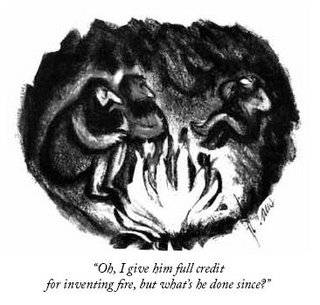'Mankind: The Story of All of Us', a popular TV series in US, was recently shown in India on History channel.
I wish I looked this good even in 21st century...
I saw its episode titled "Inventors". Its short description on the website of the channel is as follows:
"On a unique planet, a unique species takes its first steps: Mankind begins. But it s a world full of danger. Threatened by extinction, we innovate to survive–discovering fire and farming; building cities and pyramids; inventing trade–and mastering the art of war. From humble beginnings, we become the dominant creature on the planet. Now the future belongs to us."
The subject of discovering fire has always fascinated cartoonists.
Here is my pick of them.

Artist : Robert Kraus (1925-2001), The New Yorker, July 1960
The guy who invented the fire , no less, is relaxing and his fellow cavemen are bitching about him- "what's he done since?".
The above is easily one of the best cartoons I have seen. The cartoon is almost of the same age as me. I am so boring and falling apart while the cartoon keeps delighting.
Then making fire was not an easy skill. The guys who mastered it were perhaps hard to find. Just like today's plumbers, electricians, LPG cylinder delivery men etc. People waited for them endlessly, saying encouraging words like : 'we have to stick around' until they came.
Artist: David Sipress, The New Yorker, June 2013

